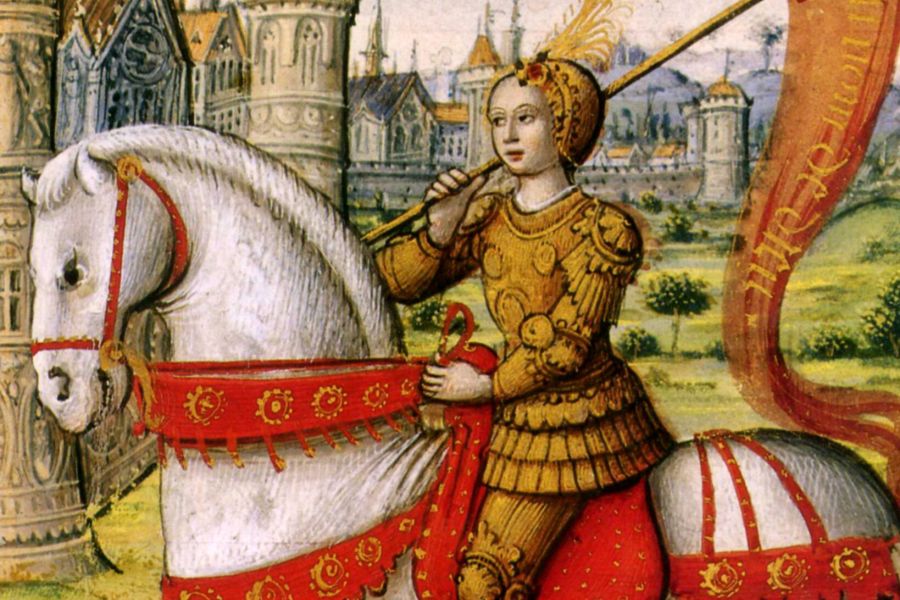‘Into the Deep’: Abigail Favale’s Voyage Through Feminism and Faith
Exploring the tensions between feminism and Catholicism with the 2024 reboot of her memoir and her writings as a convert.

University of Notre Dame professor Abigail Favale created a stir not long ago with the release of the Genesis of Gender (Ignatius Press), a review of the current transgender confusion and its implications for the sacrament of marriage and, in fact, the entire Catholic Church.
The book was preceded by her 2018 memoir, Into the Deep (also Ignatius), which described this evangelical-raised Midwesterner’s slow but steady journey from a committed feminist to an ardent Catholic.
Into the Deep was reissued in August 2024, with a few minor changes and revisions. Taken together however, the two books can be seen as a blended narrative outlining how the author’s recognition of feminism’s shortcomings propelled her toward “an unlikely Catholic conversion.”
The tension between Christianity and feminism was still an open question as Favale began writing the memoir, but it would play a major part in sitting down to compose the Genesis of Gender book.
After outlining Favale’s progression to Catholicism, the Genesis of Gender discusses the concept of gender and how it is understood in a Catholic paradigm.
“When I wrote the conversion memoir, I was still figuring out my relationship to feminism as a new Catholic,” Favale told the Register. “Was I still a feminist? If so, in what way? I was genuinely unsure, and a bit wary of feminism, because it had kept me away from God for so long.” Favale’s second book was originally intended to examine the relationship between feminism and Catholicism, but as she began writing a chapter on gender, that topic took on a life of its own.
“I realized there was so much to say on that topic, and this was when the first wave of young female de-transitioners was going public with their stories, and so the book project shifted in that direction,” she said. “There are still many more questions and topics related to the intersection of feminism and Catholicism that I have not yet fully explored in my writing.”
The central question in the two books is the relationship between Catholicism and feminism, an issue still top of mind for Favale. “I think it is a very complex relationship, and there is still a lot more to be teased out and written about.”
Favale describes her growing disenchantment with feminism’s ideological underpinnings early in the memoir: “I was becoming, somewhat reluctantly, more aware of the blind spots of a narrative that too simplistically sees the world in terms of autonomy, power, and conflict, a zero-sum game wherein men are always privileged over women. I began to prod tentatively the limits of this totalizing story. I hadn’t lost my feminist faith, but I was, for the first time, yielding the floor to questions.”
Favale suggests the two books could become a useful resource for Catholic women ambivalent about traditional feminism and its emphases on independence, authority and patriarchal power structures. She also warns against anti-feminist counter arguments that might stray beyond the Catholic faith’s teaching on gender, marriage and procreation.
“I think if there are people who are in RCIA [Rite of Christian Initiation of Adults] or potential converts interested in the Catholic faith but who are wrestling with the questions related to women and sexuality, this could be a really good resource.”
At the same time, she warns against extremism on both sides of the issue. “On the one hand,” Favale said, “you have the more long-standing liberal or progressive feminists who would take a posture of suspicion or revisionism to the Church. They want the Church to change and adapt itself in order to make more sense from a feminist perspective.” This could lead to an ultra-conservative anti-feminist backlash that might further blur Church teaching on the gender roles and the role of women in the divine plan, she explained.
“Those sides, extremes — locked in a battle — are kind of a memetic rivalry,” Favale added. “I think what the Church teaches on this question doesn’t fit into either of those extremes, and that’s what is being overlooked in this clash between the two sides. There is a big need for an articulation of the Church’s vision for women that does not fit easily into the traditionalist anti-feminist box or the progressive-feminist box.”
As Favale observed in the reissued Into the Deep book, “While the Church must always work to make her truth come alive and be heard in the present age — which is difficult, if the Church is not a coherent entity — she must also preserve it from being harassed by the zeitgeist and made to serve its ends. When this happens, Christianity loses its countercultural witness, its prophetic voice, which will always, in one way or another, be at odds with the surrounding society.”
Favale admits that while her faith journey was atypical, it was buttressed by a keen desire to understand the ultimate purpose of the Creator’s “male and female he created them” (Genesis 1:27).
“It seems like a strange evolution to go from postmodern feminism to Roman Catholicism, but from the inside, I can see that for me it is this continual quest for understanding the deeper meaning and significance of sexual difference,” she said, “and I think it’s the Catholic tradition alone that has really given the most [satisfying] response to that question.”
The meaning of sexual difference is a question Favale has been “chasing” all her adult life. Initially, she explored the basic tenets of feminism and found the answers to be insufficient.
“When I talk about this desire to feed the intuition that sexual difference is meaningful, and that it carries profound meaning that goes beyond simple roles and functions in this life, part of that is the symbolic meaning, which is grounded in God himself. It is part of God’s self-revelation: the symbolism and symbolic content that we have, that Revelation gives us is something profoundly meaningful; and in the Mass there’s a dramatic liturgical expression of the nuptial structure of all reality.”
Favale insists the memoir was not written “to preach to the choir” or to make Catholic readers feel good, “but I really did write it with non-Catholics in mind.”
To date, the reaction to the two books has been mixed. Favale has heard from some readers, many of whom were former feminists, who said the books have provided helpful insights. “I think on an individual level, there are readers who are coming from a more liberal perspective who have found my work meaningful and helpful.”
As the author noted part way through the Genesis of Gender, “the yearning that initially drove me to feminism was fulfilled, at last, in Catholicism.”
Mike Mastromatteo is a writer, editor and book reviewer from Toronto
- Keywords:
- into the deep
- Abigail Favale
- feminism
















